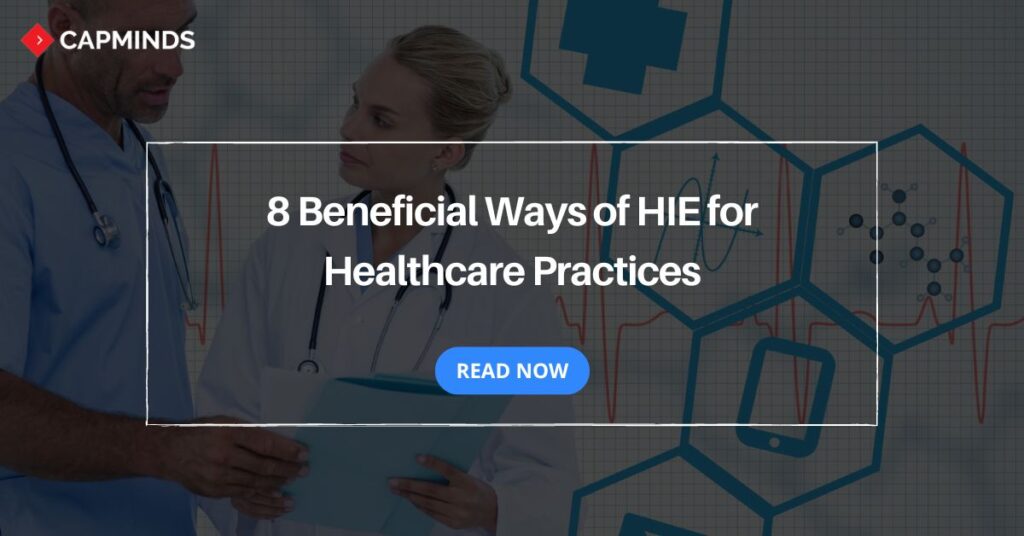8 Beneficial Ways of HIE for Healthcare Practices
Effective exchange of health data is crucial for practices to deliver quality care together collaboratively and optimize their operations. HIE enables a flow of patient health information between different providers, healthcare systems, and other stakeholders.
HIE represents a new approach to healthcare delivery from care coordination to cost savings. This blog article discusses ten ways Health Information Exchange can benefit your healthcare operations.
What is Health Information Exchange (HIE)?
Health Information Exchange (HIE) is the process of securely transferring patient health data among multiple healthcare providers, systems, pharmacies, staff, and others electronically.
Several factors are driving global demand for health information exchange, including a growing patient-centered approach, increased adoption of EHRs, and a growing emphasis on lowering healthcare costs.
- HIE makes full patient health information available to all healthcare practitioners, enabling them to make better decisions.
- Finally, this improves patient outcomes and lowers healthcare costs.
- Help to improve coordination between providers, leading to more coordinative care and quality healthcare delivery.
Related: What To Look For When Considering Health Information Exchange (HIE)
8 Benefits of HIE for Healthcare Practices
Health Information Exchange (HIE) offers various benefits for healthcare providers to improve quality of care. Here are the 8 Key Benefits of HIE for healthcare practices:
1. Collaborative care
- HIE promotes care coordination and effective communication between various healthcare providers who are all involved in patient care.
- It eliminates the need for manual data exchange and reduces errors.
- Providers can easily access patient information in the system shared by another healthcare provider, reducing the miscommunication risks.
- This way, providers can easily make more informed decision making collaboratively.
2. Access to complete medical information
- With the help of HIE, healthcare professionals can have comprehensive access to complete patient information.
- Patient medical information includes demographics, medications, diagnosis history, allergies, and past & up to date test results.
- This results in fewer needless repeat tests, avoided medication interactions, and more efficient and customized care.
3. Enhance productivity
- HIE eliminates the need for manual paperwork and time-consuming administrative process.
- This way, it allows healthcare professionals to efficiently focus on patient healthcare.
- These improvements result in cost reductions for both healthcare professionals and patients.
4. Informed Decision Making
- HIE provides complete patient information from multiple sources, giving a comprehensive view for better treatment decisions.
- Reduces duplicate testing, saving costs, and ensuring timely, appropriate care.
- Makes it easier for care coordination between providers, enabling more informed decision-making for complex patients.
5. Emergency care support
- Health Information Exchange is more valuable during emergency times when urgent diagnosis is needed the most.
- This ensures that the patient is receiving the best and most effective care, reducing medical errors or adverse drug interactions during ER visits.
- HIE promotes better care coordination between emergency and primary/specialist providers.
6. Reduce readmissions
- HIE offers real-time access to patient up-to-date health information.
- It enables informed decision-making and intervention if a patient’s condition worsens, potentially avoiding a readmission.
- When the patient is discharged, HIE transfers information to the patient’s primary care providers.
- This way, the care team will be aware of the patient’s discharge plan and can follow up accordingly.
7. Improves public health surveillance
- Health information exchange allows real-time data analysis from various healthcare providers and public health agencies.
- This enables early detection of disease outbreaks, monitoring the trends, and rapid identification of emerging health threats.
- HIE provides public health officials with an up-to-date view of the health status of a community.
- This increased awareness of the situation allows effective resource allocation, focused interventions, and timely response to public health emergencies.
8. Patient empowerment
- Health information exchange allows patients to have complete access to their medical records.
- This empowers patients by giving them a more comprehensive understanding of their health, allowing them to make more informed decisions about their health.
- Additionally, HIE helps patients feel more in control of their healthcare.
- When patients have access to their health information, they are better equipped to actively participate in their care.
Related: Top 10 Roles of OpenEMR in Improving Health Information Exchange
CapMinds Health Information Exchange Service
Health Information Exchange is the future of healthcare. Are you struggling to share patient data across your healthcare network? CapMinds health information exchange can help you.
Our professional technicians help you to seamlessly flow health information between providers and systems, enabling improved care coordination. By utilizing CapMinds for HIE, you can:
- Securely share patient data, test results, and other clinical data in real time.
- It will be low-cost, and the perfect budget solution for your practice’s long-term future.
- CapMinds prioritizes secure data management & ensures compliance with industry regulations, offering healthcare providers peace of mind.
- Improve care coordination between primary care providers, specialists, and others.
- Reduce administrative burdens and reduce duplicate tests through automated data exchange.
Don’t let the disconnected health data hold your organization back! Experience the comprehensive solution from CapMinds HIE services today.

